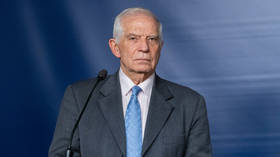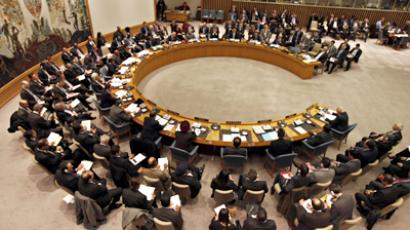Merkel seeking euro-savior and Iran-buster in China
Angela Merkel says China’s help in the eurozone would boost not only the debt-ridden region, but the global economy in general. The German Chancellor is paying a three-day visit to Beijing, seeking economic and political support.
“The euro has made Europe stronger,” Merkel asserted in a speech at China’s Academy of Social Sciences, just hours before meeting her counterpart, Premier Wen Jiabao.She said despite the ongoing sovereign debt crisis, Europe was “on the right track” with its plan to curb overspending. Merkel said the EU had made “big progress” over the past few years.China, which has the world’s largest financial reserves, is seeking investment opportunities around the globe, and the money would be handy for tackling Europe’s problems.Meanwhile, China's Prime Minister, Wen Jiabao, said Beijing is considering increasing its help to the eurozone.“China will use its money, which is hard-earned, very wisely,” Christoph Horstel, government consultant and political analyst told RT. “That means they will have single investments not so much in the eurozone […], but in any case, more directly into companies – things that are strategically on the Chinese agenda.”At the same time, Horstel believes Merkel “will even not lobby very much for Chinese investment into Europe because she knows that this is truly a bad investment.”
The leader of Europe’s biggest economy also called for a level playing field for German firms operating in China, and vice versa.On the political front, Merkel called for support on Syria and Iran, the two pressing issues on the global agenda.Germany needs China’s backing for a UN Security Council draft resolution which would call on Syrian President Assad to step down. Beijing and Moscow, both veto-wielding members of the Council, oppose it."It is important that the international community speak with one voice at the United Nations," the German leader said.However, there is no possibility that “Angela Merkel can actually change the Chinese position on the pace of Syria as well,” Yongjin Zhang, Professor of International Politics from the University of Bristol, told RT.As for Iran, Beijing has refused to join the US and EU in imposing sanctions on the Islamic Republic’s oil industry. Being the largest importer of Iranian oil, China is in a position to put much leverage on Tehran, which Merkel hopes to convince the Chinese government to do.In order to win favors from China, Berlin may offer its support on issues of importance to Beijing, particularly in “dealing with the US,” says Simon Shen, a professor at the University of Hong Kong.“Germany is the most powerful member of the EU, and China has always wished to lobby Germany's support,” he told RT.It is in China’s best interests to support the EU and now is the perfect time to do it, David Gosset, director of the China Europe International Business School, told RT. “We have all the signals which indicate that Europe is going out of the financial crisis,” he said. “China wants to live in a multi-polar world and there is no multi-polar world without a successful EU, and there is no successful EU without a strong eurozone.”Among other issues high on the agenda is the rare earths trade. The elements are essential for the manufacture of many high-tech products, and China, the world’s leading exporter, is accused of restricting its trade in a bid to drive up prices and make businesses move onto its territories. Beijing is citing environmental concerns as the reason for mining restrictions.














